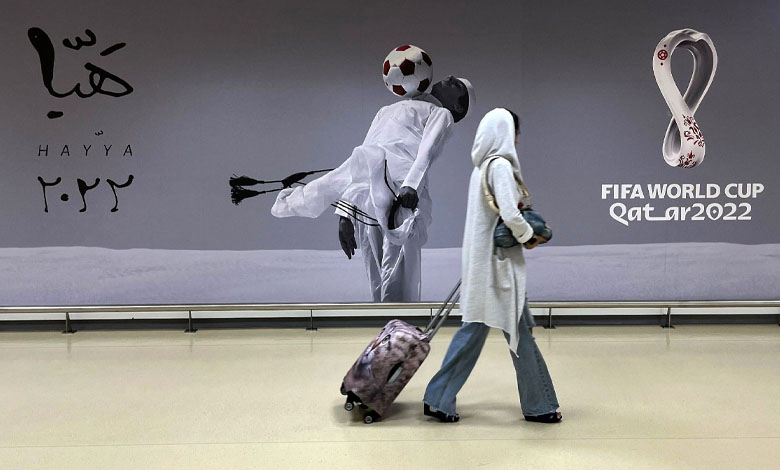Lack of human rights for women in Qatar means that even privileged like me must do what men say

A young Qatari woman relates the suffering of women in a male society with distinction because of male domination over them in all aspects of life.. No freedom, no justice, no equality, even the simplest rights. On the other hand there is domination, oppression, deprivation and psychological oppression, and physical violence, and no laws that do justice to women.

As people around the world watch videos of men smiling and waving flags outside Doha’s stadiums, they are only seeing one side of the story: what this country is like for a man. In fact, they probably aren’t seeing many women at all.
I’m a 23-year-old Qatari woman, and I don’t longingly look out towards the West and think, “I wish I wasn’t so oppressed.” Western experiences aren’t all the same. But since I was a child, I’ve come up against rules and restrictions that limit my freedom.
The moment that I realised I was being treated differently from my brothers was when I was three or four, and I came home from a day out with my family. My three brothers went with my father to the majlis, a room where he would entertain male visitors. I was not allowed in because I was a girl.
Masculinity in Qatar is tied to freedom: the ability to talk to people, to host and entertain. Even now, my younger brothers speak more fluently than I do and have better social skills, because talking to strangers was a daily thing for them.
Despite this, in many ways, I lead a much “freer” lifestyle than many women in the UK or in the US, because I come from a wealthy family with access to the best education. There are 330,000 native Qataris, compared with a migrant population of more than two million. Everyone in the ruling class is paid a monthly allowance by the government — it may be anything from £2,200 to about £6,000, depending on your status and gender. State employees are paid an additional bonus on top of their salaries.
Money affords me privileges that others can’t dream of. In Qatar we don’t have a nuclear family structure like in the West. If you’re born into privilege, there are other people involved. Our family had a driver, a housemaid, nannies and a gardener. My first language isn’t Arabic — it’s English, because that’s the language in which I spoke to my nanny, who was Sri Lankan. In many ways I was closer to her than my own mother. Girls go to school in Qatar. I attended a fee-paying school and studied the British curriculum, but education is free to all citizens.
Not all Qatari women wear the veil. When I was 12 or 13, my parents asked if I had thought about it, and if I had decided what I might like to do, if I wanted to wait or had any questions. I decided to say yes, so I started wearing a type of turban at first to cover my hair, then later I started wearing the shayla and the abaya.
Many women go to university as I do. In fact there are more female university graduates in Qatar than males. But that’s often where opportunity ends: the employment rate in Qatar for men is double that of women. As a woman, your priority is to get married and have children. I’ve heard of many women being told by their families that they weren’t allowed to go horse riding or cycling, because their virginity would be ruined and they would be impure. Once when I was a teenager, my aunt told me: “After God, the next person you obey is your husband.”
But today the birth rate is falling, as women pursue careers. Qatari women are also subject to a guardianship system, which is part of sharia. Women need the permission of a guardian, usually a father or brother, to marry, to get government jobs and to apply for a university scholarship. Once married, their guardian is then their husband. Women under 25 must ask permission from their guardian to leave the country.
Culturally, however, guardianship can last a lifetime. A woman’s husband can take out a travel ban to prevent her from leaving the country at any age, and airport officials have been known to stop women from leaving the country on their own. There is no one to appeal to; there are no anti-discrimination laws.
Most women my age hate the guardianship rules, and things are changing in Qatar, but culture is slow to follow. As of January 2020 women don’t need permission to drive, but my father won’t allow it. He said to me, “What if you get into a car crash? Will people see you on the street arguing with a man?” There have been academic trips abroad that I haven’t been allowed to go on. I wanted to study in the UK, but he forbade it. He said, “What will people say when they find out my daughter is sleeping in a house that isn’t mine?”
For my dad, it’s not really about anything other than what other people will say. Everyone knows everyone here. I have tried to fight him so many times, but sometimes you have to pick your battles. I am due to get married to a man who asked my parents for permission, and to whom I have also said yes — that’s how it works here (I’ve already rejected a couple of proposals because they didn’t feel right). The man I’m marrying is a friend of my family’s, and I think he shares a lot of my feminist values, too. From the messages we’ve been sending each other, we seem to be clicking really well. We have met, but only with our families there.
Some of my friends don’t want to get married, because they’re afraid that the person they’ll end up with is going to be more oppressive than their parents. That’s always a risk. There are no laws on rape within marriage. There is contraception, but not emergency contraception such as the morning-after pill, and abortion is only legal in cases of abnormalities with the foetus. Even then, a man must provide consent.
Women can write the terms they want their husband to adhere to in a marriage certificate. They might say something like: “You can’t stop me from getting an education; you can’t stop me from driving,” so that if your husband goes against them, you have proof that he’s violated the terms you agreed to. But unfortunately, not a lot of women do that — it’s seen as bad taste for the woman to ask, and a slight on her husband’s family.
Qatari women can’t get a divorce easily. I know some older people who are trapped in marriages that are oppressive, that are physically and emotionally abusive, and yet they can’t escape. If you have children, the father is their legal guardian, and he can stop them leaving the country. The law in Qatar is not there to protect women; it is there to empower men. And there is no way to speak out about it. I have TikTok and Instagram, and often women use Twitter to talk about these topics — sometimes anonymously. Not a lot of Qatari women show their faces online, it’s still a sort of taboo.
مقطع فيديو لطرد مشجعة من ملعب قطري في الدوحة، بسبب ارتدائها قميصا كتبت عليه “المرأة، الحياة، الحرية”، وهو شعار المحتجين في #إيران ضد نظام الملالي.#احتجاجات_إيران pic.twitter.com/JOHgkZBCq6
— إيران إنترناشيونال-عربي (@IranIntl_Ar) November 28, 2022
I do have some freedom, though. I go to the mall and have even walked around Doha on my own and with friends, against my parents’ wishes. It isn’t the danger; Qatar is very safe. Often it’s so hot that the streets are empty, and I find it scarier to be on the Tube in London. I rarely see migrant workers here, who aren’t allowed to live in Doha and reside in camps outside the city instead. They aren’t allowed to bring their family, and there is a feeling here that they are all bachelors who would do harm to women. On Fridays in the mall they’ll say it’s “family only day”, and that is lingo for “no migrant workers”. For my parents, it is more of a status thing. They don’t want me to be seen walking, because people would think: can’t you afford a car? Why would you use public transport?

There are public beaches in Doha with women-only days and private beach clubs too, but I rarely go. You might not see women in the stadiums for the World Cup, but they are there. I have friends and family who have been. I know that there is an argument in the West that the World Cup shouldn’t have been held here but I disagree. I remain optimistic that it can be a force for good. With the world watching closely, there’s nowhere for the government to hide.












